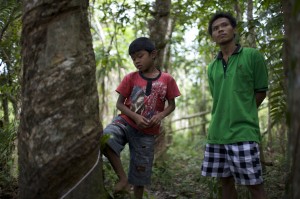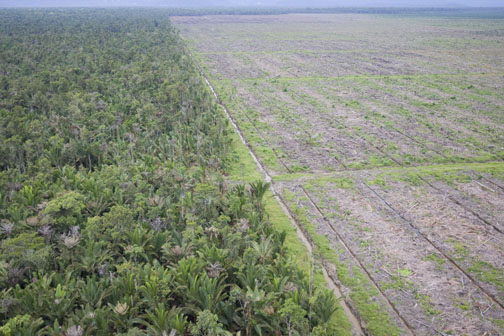
Last week, Norman Jiwan of Sawit Watch, an Indonesian NGO ally concerned with the ongoing adverse social and environmental impacts of palm oil plantations, wrote an op-ed in the Jakarta Post. The op-ed entitled, Deforestation moratorium is not panacea?, stated his view on the recently signed $1 billion dollar Indonesia-Norway Letter of Intent (LoI) which is designed to reduce deforestation and related carbon emissions in Indonesia.
The LoI has received significant international attention as the latest step by governments worldwide to push Reduced Emissions through avoided Deforestation and Degradation (REDD) into the forefront of climate change mitigation techniques.
The LoI holds great promise to reduce rainforest destruction, serious and widespread land conflicts, and climate changing carbon emissions, but Jiwan said he was not alone in expressing concerns around this latest REDD initiative.
“Many environmental and social NGOs are skeptical with the moratorium commitment. Many question on whether the government can achieve the noble objective of the partnership. The palm oil industry is facing abundant dilemmas that might hamper the moratorium commitment due to an absence of a much needed system, institutions and implementing framework with strong and proper social, economic and cultural as well as environmental considerations.”
 From my time in Sumatra last month, I heard similar concerns from many of the communities and NGO’s in the provinces of Riau and Aceh. To be effective in conserving forest and respecting basic human rights, it is clear that the perspectives of all stakeholders, including Indigenous and communities and civil society groups, must be fully included in the planning, implementation and evaluation of REDD projects in Indonesia.
From my time in Sumatra last month, I heard similar concerns from many of the communities and NGO’s in the provinces of Riau and Aceh. To be effective in conserving forest and respecting basic human rights, it is clear that the perspectives of all stakeholders, including Indigenous and communities and civil society groups, must be fully included in the planning, implementation and evaluation of REDD projects in Indonesia.
In his op-ed, Jiwan also pointed out that a freeze on new forest concessions in Indonesia starting in 2011 is not enough:
“The moratorium must be extended to zero conversion of primary forests and other high conservation value ecosystems within the existing concessions. The government also must ensure the effective monitoring of the slash and burning policy, evaluate and revoke the certificates for oil palm in disputed areas with local communities.”
Thorough investigations into Indonesia’s forestry sector have shown a lack of compliance with Indonesian law to be common at Indonesia’s industrial logging and agriculture operations. As Jiwan stresses, “When plantation companies and mills committed illegal practices and irresponsible operations, the government must be firm in upholding the rules of the laws.”
Basic to any effort to control deforestation is a sturdy foundation for the rule of law, and until underlying issues of governance, corruption, and compliance are addressed in Indonesia, there is a chance that Norway’s billion dollars and the prospect of a just, green, and low carbon development future for Indonesia could well be captured by the same elites and corporate interest that have fueled corruption, social conflict, and environmental harm in the past.